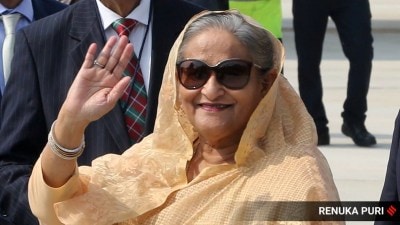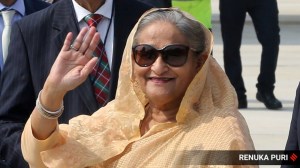Musharraf’s pack of cards
Pakistan now has a parliament and a Prime Minister but it is far from being a democracy. General Pervez Musharraf still wields powers that h...

Pakistan now has a parliament and a Prime Minister but it is far from being a democracy. General Pervez Musharraf still wields powers that he gave himself through the Legal Framework Order (LFO), which overrides the country’s constitution in several respects.
The intelligence-military complex, often referred to as ‘the establishment’, retains its ability to run the show behind the scenes. In fact, the ‘election’ of Zafarullah Jamali by the barest of majorities was facilitated by the establishment’s machinations. Jamali owes his appointment to the defection of ten parliamentarians from Benazir Bhutto’s Pakistan Peoples Party (PPP), six of whom have been rewarded with cabinet positions, rather than genuine support among members of the National assembly.
Although the establishment and its apologists always speak from a fictitious moral pedestal, they see nothing wrong in engineering defections from political parties within days of a general election. The new set-up is clearly a house of cards that can be brought down by any number of factors. First among these are the contradictions of pretending to be a democracy without really being one.
To establish the credibility of the new parliament, Musharraf must allow it a degree of freedom. But the exercise of this freedom by independent-minded MPs could result in debates that the general wishes to sweep under the carpet.
The country’s constitutional scheme is far from clear. The LFO supersedes the constitution but the constitution has been partially restored. Most MPs consider themselves subject to the unadulterated 1973 constitution, while Musharraf does not want to subject the constitutional amendments decreed by him to a vote by the elected assembly.
Arguments to the effect that opponents of the constitutional amendments should seek redress from the judiciary are hardly very convincing. The present Supreme Court is itself a creature of Musharraf’s Provisional Constitution Order (PCO). While its authority may not be in doubt, its legitimacy is subject to the same type of questions that relate to General Musharraf’s presidency and his status as lawmaker.
Musharraf’s dilemma is that restraining parliament in its early days would make the institution seem less than sovereign, which would reduce his claims of having restored democracy to a greater farce than it already seems. The new Prime Minister, Jamali, also faces a similar dilemma. If he toes the general’s line too closely, he runs the risk of not being taken seriously.
If, however, he starts asserting himself, he could be sent packing sooner than he has bargained for. The opposition, on the other hand, starts with tremendous advantage. The Islamic MMA will control the provincial government in NWFP, enabling it to dispense patronage while remaining the opposition at the centre. Ideological cohesion and the prospect of further political gains in the future will make it difficult for the establishment to divide the MMA.
The PPP, on the other hand, remains a significant force in Sindh and can challenge the intelligence-military complex’s domination of Pakistan’s politics by raising issues the GHQ does not want discussed. The perks of Pakistan’s military elite are coming under fire even in the international media. Once PPP has been pushed to the wall, it can fight back as an anti-establishment party.
In its effort to keep the PPP out, the Musharraf regime is trying to revive the fortunes of the Muttahida Qaumi Movement (MQM), which withdrew support to the Jamali government and later rejoined. From the MQM’s point of view, it would be a blessing to be declared patriotic once again after having been painted as anti-Pakistan for several years.
But while Altaf Husain’s organisation will not be averse to the perks of power and renewed respectability, its political support base remains deeply anti-establishment. The MMA’s electoral showing in MQM strongholds of Karachi and Hyderabad has reinforced the rivalry between the Islamic parties and the MQM. This rivalry could come to a head again, once MQM reverts to its past pattern of violence.
The artificial optimism of Musharraf and his team notwithstanding, Pakistan’s problems have multiplied rather than diminished under the ad-hoc arrangement of the last three years. Improvements in the fiscal economy have not benefited the ordinary Pakistani, who continues to face the prospect of unemployment, poverty and lawlessness. By all accounts, more Pakistanis (between 34-39 % of the population) live below the poverty line today than they did three years ago.
The country’s role as a frontline state in the global war against terrorism is leading to closer scrutiny of Pakistan’s regional and international role. Investment and economic growth are at a standstill.
These are certainly not times in which secretive decision-making and political covert operations can inspire the nation or win it friends around the world. Pakistan needs predictability that can only be attained through return to rule of law, not by the whimsical system of governance that has spawned 125 decrees (ordinances) by Musharraf since the beginning of 2002 alone.
Jamali should try to persuade his mentors of the deadly effects of their political interventions. If he does that, he would earn a place in history much more significant than as Pakistan’s 16th Prime Minister.
Write to hhaqqaniexpressindia.com



- 01
- 02
- 03
- 04
- 05




























